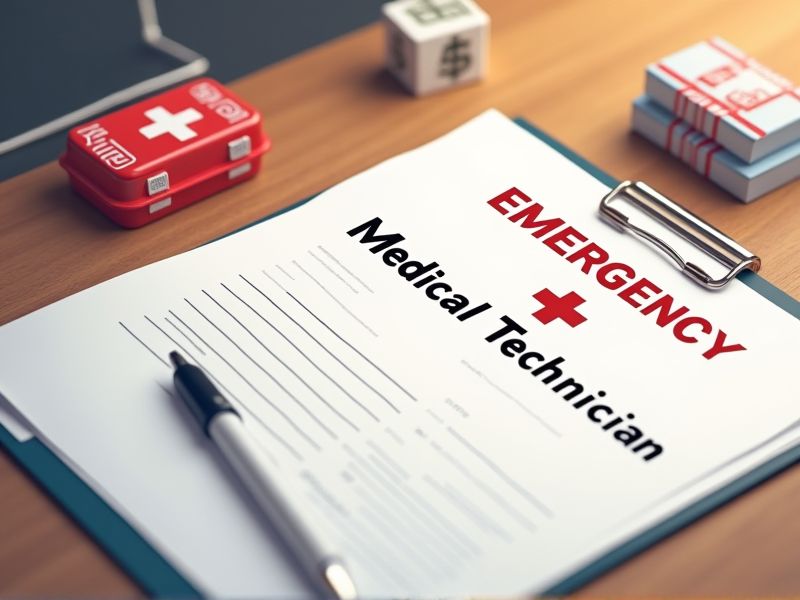
Emergency Medical Technicians (EMTs) play a critical role in delivering urgent medical care during emergencies, often serving as the first line of healthcare providers. Acquiring specific certifications ensures that EMTs possess the necessary skills and knowledge to respond effectively to diverse medical situations. The certifications also standardize practices, which helps in maintaining consistent and reliable care across various settings. Key certifications contribute to a competent practice for an Emergency Medical Technician.
National Registry of Emergency Medical Technicians (NREMT) Certification
The NREMT Certification ensures that Emergency Medical Technicians (EMTs) meet a nationally recognized standard of knowledge and skills, which enhances public trust in emergency care services. By requiring this certification, states can maintain a consistent level of competence across EMTs, reducing the likelihood of regional disparities in the quality of emergency medical care. The certification process involves rigorous testing that evaluates an EMT's ability to respond effectively to various medical emergencies, thereby minimizing response errors. Continuous education and re-certification mandated by the NREMT guarantee that practitioners remain current with evolving medical protocols and technologies, improving patient outcomes.
Basic Life Support (BLS) Certification
Having a Basic Life Support (BLS) certification ensures that an Emergency Medical Technician (EMT) can effectively manage critical situations by providing essential skills like CPR. The certification equips EMTs with the ability to stabilize patients during the crucial moments before they reach a hospital setting. Mastery of BLS protocols reduces the likelihood of fatal outcomes by increasing the EMT's response efficiency. Continuous BLS certification reinforces an EMT's preparedness for a variety of emergencies, aligning their skills with the latest medical standards.
CPR/AED Certification
CPR/AED certification equips Emergency Medical Technicians (EMTs) with essential skills to revive patients experiencing cardiac arrest, increasing their survival chances. Regulations and protocols often mandate such certification to ensure EMTs are prepared for life-threatening situations. Having this certification demonstrates proficiency and credibility in handling emergencies. Regular training updates keep EMTs well-versed in current lifesaving techniques.
Advanced Cardiac Life Support (ACLS) Certification
ACLS certification enhances an EMT's skills in managing cardiovascular emergencies like cardiac arrest and stroke. It provides standardized protocols and techniques vital for high-pressure situations, increasing patient survival rates. The certification equips EMTs to work effectively in teams with medical professionals, ensuring cohesive and precise patient care. Regulations often mandate ACLS certification to guarantee that EMTs are proficient in advanced life-support methods.
Pediatric Advanced Life Support (PALS) Certification
PALS certification equips Emergency Medical Technicians (EMTs) with specialized skills to effectively manage and respond to pediatric emergencies, improving survival rates. The certification ensures EMTs are proficient in recognizing and treating life-threatening conditions such as respiratory failure or shock in children. It provides a standardized approach to pediatric care, essential for maintaining a high level of competency and confidence in emergency scenarios. With certified training, EMTs can deliver quicker and more accurate interventions, optimizing outcomes for young patients in critical situations.
Prehospital Trauma Life Support (PHTLS) Certification
Emergency Medical Technicians (EMTs) require Prehospital Trauma Life Support (PHTLS) certification to improve their capability in managing trauma situations effectively, reducing the risk of preventable deaths. PHTLS training enhances EMTs' understanding of the life-saving principles of rapid assessment, prompt intervention, and efficient transportation. This certification standardizes trauma care across diverse emergency scenarios, ensuring consistent and high-quality treatment. EMTs equipped with PHTLS certification demonstrate a higher proficiency in applying evidence-based practices, directly impacting patient survival rates and outcomes.
Emergency Vehicle Operations Course (EVOC) Certification
Emergency Vehicle Operations Course (EVOC) certification is essential for Emergency Medical Technicians (EMTs) because it equips them with crucial skills to safely and effectively navigate emergency vehicles in high-pressure situations. Certification reduces the risk of accidents, enhancing public and personal safety, as EMTs often operate at high speeds through unpredictable traffic conditions. Proficiency gained through the EVOC ensures compliance with legal and organizational guidelines, preventing potential liabilities. EMTs with this certification can more reliably meet critical response times, directly impacting patient outcomes in emergencies.
Hazardous Materials (HazMat) Awareness Certification
Emergency Medical Technicians (EMTs) encounter various situations where hazardous materials may be present. HazMat Awareness Certification equips EMTs with the knowledge to recognize these dangers quickly, reducing health risks. Proper identification of such materials ensures the safety of both EMTs and patients during emergency responses. An informed response can prevent further contamination, protecting public health and safety.
Community Emergency Response Team (CERT) Certification
Community Emergency Response Team (CERT) certification equips Emergency Medical Technicians (EMTs) with essential skills for managing disasters when professional responders are not immediately available. This certification fosters enhanced teamwork and communication, crucial for coordinating with both volunteers and emergency services during crises. EMTs with CERT training contribute to comprehensive disaster response by participating in community preparedness and resilience-building efforts. More broadly, CERT-certified EMTs are better positioned to educate the public on emergency preparedness, increasing overall community safety.
Tactical Combat Casualty Care (TCCC) Certification
Emergency Medical Technicians (EMTs) equipped with Tactical Combat Casualty Care (TCCC) Certification can effectively manage trauma in high-threat environments, enhancing their operational readiness. This training focuses on life-saving techniques under combat-like conditions, addressing the leading causes of preventable death in such scenarios. By understanding key principles such as hemorrhage control and rapid evacuation, EMTs can significantly increase survival rates. Incorporating TCCC principles into their skill set allows EMTs to adapt their pre-hospital care strategies to military and civilian emergencies.
Summary
When you earn certifications as an Emergency Medical Technician (EMT), your skills and knowledge expand significantly. Employers recognize you as more capable and often prioritize hiring you over others. With these certifications, you can handle more complex medical situations, which enhances your confidence in the field. Your career advancement opportunities improve, leading to potential salary increases and specialized roles.
